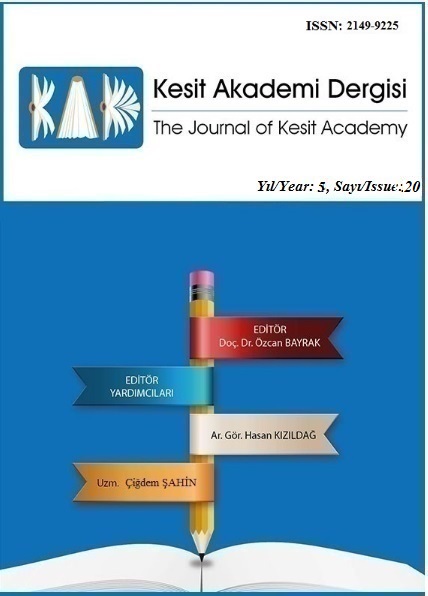RUPERT BROOKE’UN “THE SOLDIER” VE RUDYARD KIPLING’İN “FOR ALL WE HAVE AND ARE” ADLI ŞİİRLERİNDE SAVAŞIN KARANLIK YÜZÜNÜN ARKA PLANDA TUTULMASI
Author :
Abstract
Eski zamanlarda, savaş kültürü vatanseverlik ve savaşta ölmenin şanı üzerine kurulmuştu İngiliz şairlerden Rupert Brooke ve Rudyard Kipling, şiirlerindeki kendine has tarzlarını bir savaş propagandası aracı olarak toplumu manipüle etmek amacıyla kullanmışlardır. Brooke'un “The Soldier” (1914) adlı şiiri, savaşmanın ana vatan için ne kadar kutsal olduğundan ve insanların savaşta öldükten sonra nasıl ödüllendirileceğinden bahsetmiştir. Benzer şekilde, Rudyard Kipling “For All We Have and Are” (1914) adlı şiirinde, askerleri savaşmaya çağırmış, düşmanın yıkıcılığına odaklanmış ve İngiltere'nin kendisini karşısındaki yıkıcı düşmandan korumaya ihtiyacı olduğunu vurgulamıştır. Bu çalışma, her iki şairin de vatan için mücadele adı altında, şiirlerinin arka planındaki karanlık sonuçları gizleyerek ne şekilde savaş propagandası yaptıklarını incelemeyi amaçlamaktadır.
Keywords
Abstract
In the earlier stages, the war culture is predicated on patriotism and the glory of dying in the battle. British poets Rupert Brooke and Rudyard Kipling employed their unique voice in their poetry as an instrument of war propaganda to manipulate the society. The poem “The Soldier” (1914) by Brooke carries the idea of how divine it is to fight for the motherland or how people will be rewarded after they die in the war. Similarly, Rudyard Kipling calls soldiers to fight, focuses on the destructiveness of the enemy and create the sense of that England need to protect itself from this devastating enemy in his poem “For All We Have and Are”(1914). This study aims to analyse how both poets employ war propaganda in disguise of fighting for the nation, while they hide the dark consequences of the war in the background of their poetry.
Keywords
- Amis, K. (1975). Rudyard Kipling and his world. London: Thames & Hudson.
- Amis, K. (1975). Rudyard Kipling and his world. London: Thames & Hudson.
- Gifford, D. (1995). Soldier Poets (1914-1918). Hungarian Journal of English and
- Greenblatt, S., Christ, C. T., David, A., Lewalski, B. K., Lipking, L., Logan, G., . . . Abrams, M. H. (2012). The Norton Anthology of English Literature (9th ed.). W. W. Norton & Company.
- Kendall, Tim. Poetry of the First World War: An Anthology. Oxford University Press, 2013.McLoughlin, K. (2009). The Cambridge Companion to War Writing. Cambridge: Cambridge University Press.
- Phillips, A. (2006). The Penguin Freud Reader. London: Penguin Classics. American Studies (HJEAS), 1(2), 47-63. Retrieved from http://www.jstor.org/stable/41273896
- Shaw, B. (1906). The Devil’s Disciple: A Melodrama. New York: Brentano’s Publishers.Walter, George. The Penguin Book of First World War Poetry. Penguin Group, 2006.
- Ragen, Brian Abel. “‘The Hun is at the Gate’: Rudyard Kipling’s Poetry of the First World War,”Poetry and History Conference, the University of Stirling, Scotland, June 1996. https://www.brianbaleragen.net/The-Hun-is-at-the-Gate.pdf
- Renshaw, A. (2014). Wisden on the Great War: The Lives of Crickets Fallen 1914-1918. Lon- don:John Wisden and Co, an imprint of Bloomsbury Publishing Plc.
